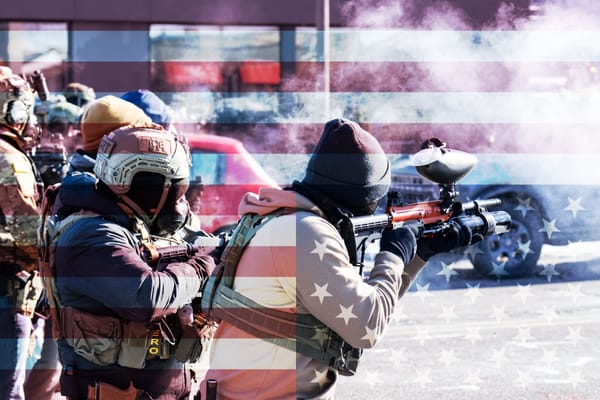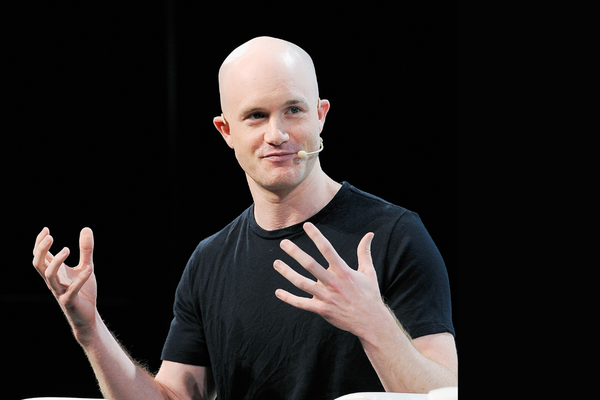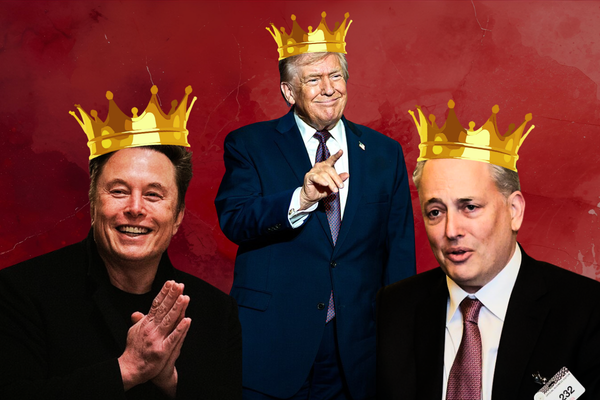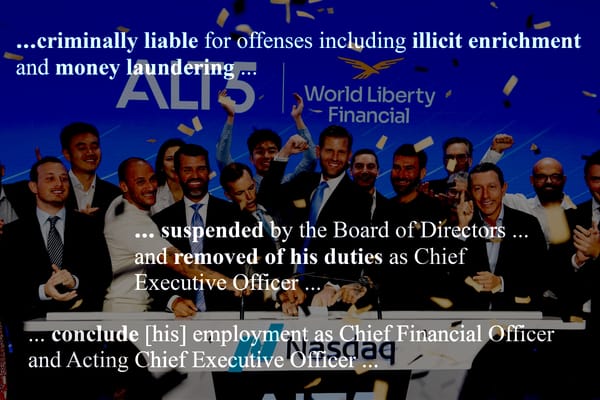Trump says he has “no idea” who he just pardoned
President Trump reacts to condemnations of his recent pardon of Binance founder Changpeng Zhao by claiming he doesn’t know who he is.
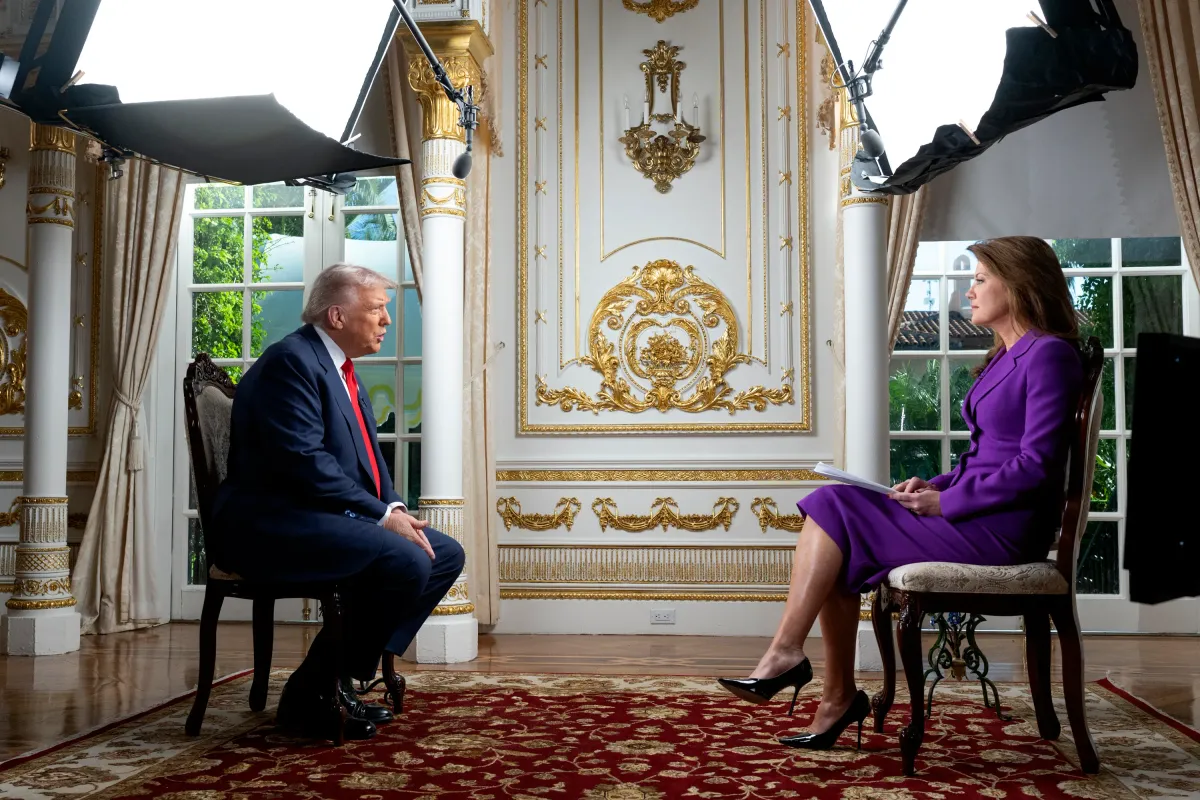
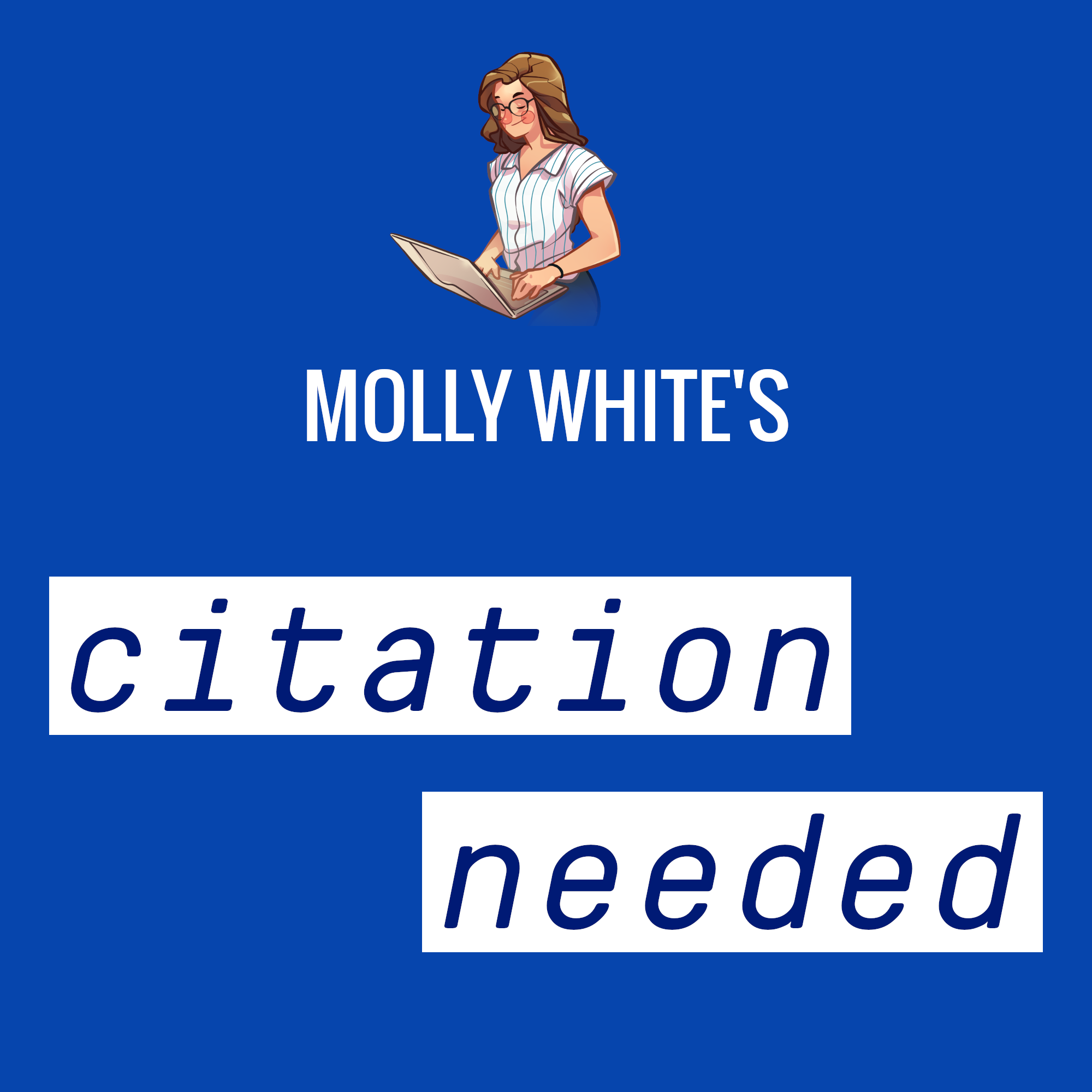
Faced with blowback over his pardon of Binance founder Changpeng Zhao, President Trump has offered a curious defense: he doesn’t even know the guy. Why Trump thinks this would somehow assuage fears that the pardon is improper is anyone’s guess.
Trump previously claimed Zhao “had a lot of support... and so I gave him a pardon at the request of a lot of good people.”1 In his latest interview, he repeatedly said he “was told” various things about Zhao — the length of his sentence, that he’s “highly respected” and “very successful”, and that he was unfairly prosecuted. He has not said who, exactly, is doing the telling.
Asked about the appearance of corruption, Trump bristled. “I’d rather not have you ask the question.”
By the time Trump pardoned him, Zhao had already served four months in prison and paid a $50 million fine after admitting he violated the Bank Secrecy Act by failing to run an effective anti–money‑laundering program at Binance. Binance itself paid $4.3 billion and pleaded guilty to three related charges involving unlicensed money-transmitting and sanctions violations. Prosecutors and regulators argued those failures helped illicit funds move to terrorists, sanctioned groups, cybercriminals, and child abusers.2
Though Trump and members of his administration have portrayed the case against CZ as mere persecution as part of a larger Biden-led war on crypto, court documents describe a CEO and other company leadership intentionally breaking US laws to maintain access to lucrative US-based customers, and setting up a complex scheme to divert regulatory attention away from the company’s crimes [Binance charges].
Citation Needed is an independent publication, entirely supported by readers like you. Consider signing up for a free or pay-what-you-want subscription — it really helps me to keep doing this work.
The CBS interview
As Trump sat down for his first interview on CBS News after the network paid him a $16 million bribe settlement and installed right-wing pundit Bari Weiss as head honcho, he waxed poetic about how he “see[s] good things happening in the news” — one of them being Weiss’s hiring, which he described as “the greatest thing that’s happened in a long time to a free and open and good press.”a Much of the interview consisted of softball questions with few follow-ups, and no fact-checking for some of Trump’s more extreme claims, such as that China is actively testing nuclear weapons — which was met only with a remark that “That would be certainly very newsworthy.”
But after the wide-ranging interview concluded, O’Donnell asked if she could squeeze in one more set of questions. After laying out the history around Changpeng “CZ” Zhao’s conviction, noting that “the government at the time said that C.Z. had caused ‘significant harm to U.S. national security’, essentially by allowing terrorist groups like Hamas to move millions of dollars around”, she asked Trump why he’d decided to pardon Zhao late last month [I95]. Trump replied, “I don’t know who he is. I know he got a four-month sentence or something like that. And I heard it was a Biden witch hunt. ... [T]his man was treated really badly by the Biden administration. And he was given a jail term. He's highly respected. He’s a very successful guy. They sent him to jail and they really set him up. That’s my opinion. I was told about it.”
Asked again why Trump would pardon someone accused of “significant harm to U.S. national security”, with O’Donnell noting the appearance of pay-to-play after Binance’s involvement in a $2 billion deal including the Trump family’s World Liberty Financial stablecoin [I95, 93, 83], Trump repeated: “I know nothing about it because I’m too busy doing the other—” then began describing his sons’ substantial crypto business dealings and the fact that his son and wife each wrote bestselling books, concluding the ramble with “I’m proud of them for doing that. I’m focused on this.”
Finally, when O’Donnell repeated, “So [you’re] not concerned about the appearance of corruption with this?” Trump seemed to grow irritated. “I can’t say, because– I can’t say– I’m not concerned. I don’t— I’d rather not have you ask the question. But I let you ask it. You just came to me and you said, ‘Can I ask another question?’ And I said, yeah. ... I don’t mind. Did I let you do it? I coulda walked away. I didn’t have to answer this question. I’m proud to answer the question.”3
Trump and Zhao are on the defensive
Since announcing the pardon on October 23, Trump and Zhao have faced sustained criticism. While some in the crypto industry praised the move, many observers outside the sector regard it as a corrupt quid pro quo paid for with benefits to Trump’s crypto businesses. Even some of Trump’s staunch allies, such as Palantir co-founder and venture capitalist Joe Lonsdale, have condemned the move. Lonsdale wrote, “POTUS has been terribly advised on this; it makes it look like massive fraud is happening around him in this area.”4
Senator Elizabeth Warren (D-MA), a longtime critic of both Trump and the crypto industry, posted to Twitter: “CZ pleaded guilty to a criminal money laundering charge and was sentenced to prison. But then he financed President Trump’s stablecoin and lobbied for a pardon. Today, he got it. If Congress does not stop this kind of corruption, it owns it.” The following day, she and the typically pro-crypto Adam Schiff (D-CA) introduced a resolution in the Senate titled “Condemning President Trump’s pardoning of Binance founder Changpeng Zhao, who had violated United States anti-money laundering laws, and calling for Congress to use its authority to stop this form of corruption.”5
Zhao hit back at Warren, demanding an immediate retraction and threatening to sue her for defamation over both the tweet and the draft resolution. Part of his displeasure seems to be related to Warren’s portrayal of his involvement in business deals involving Trump and her characterization of the pardon as part of a quid pro quo, but the retraction demand seems to center on Warren’s statement that “CZ pleaded guilty to a criminal money laundering charge”.6 While Zhao’s lawyers have maintained that that is objectively false, Warren has replied via her lawyers that the charge — in full, failing to maintain an effective anti-money laundering program — is an anti-money laundering law, and that besides, statements made in the course of her duties as a Senator are immune from defamation claims.7
Warren and six other Senators subsequently sent a letter to Attorney General Pam Bondi and Treasury Secretary Scott Bessent, stating that “The pardon–which signals to cryptocurrency executives and other white-collar criminals that they can commit crimes with impunity, so long as they enrich President Trump enough–seems likely to encourage, rather than discourage, criminal activity.”
The letter outlines a timeline during which “Binance and Mr. Zhao began cozying up to the President and his family through a series of financial deals”. It details how Zhao and Steve Witkoff met in December 2024 at a cryptocurrency conference in Abu Dhabi. (Witkoff co-founded World Liberty Financial, a crypto company partly owned by Trump and his sons. When Witkoff became Trump’s special envoy to the Middle East and special envoy for Peace Missions, the company claimed he was in the process of divesting, though recent disclosures suggest he hasn’t [I95].) Next in the timeline, the Senators cite reporting that World Liberty had “discussed doing business” with Binance, potentially by having Binance develop a stablecoin. Then, they cite reporting about World Liberty’s launch of the USD1 stablecoin, and later reporting that Binance “wrote the basic code” for the token and promoted it to its large customer base. Finally, they point to the $2 billion deal, denominated in USD1, between Binance and the Witkoff-linked Emirati firm MGX — a deal that has already earned World Liberty around $35 million in interest since May [I95]. Trump and his family members hold a stake in World Liberty, and earn a portion of its revenue.
The letter concludes with a series of questions about how Trump’s pardon will complicate law enforcement activities, what message it will send to criminals and to the crypto industry, and whether they believe Trump’s business involvement with Zhao influenced his decision. It’s signed by Senators Warren, Van Hollen (D-MD), Sanders (I-VT), Hirono (D-HI), Blumenthal (D-CT), Reed (D-RI), and Merkley (D-OR).8
Senator Chris Murphy (D-CT) has also been on the warpath over the pardon, which he has called “pay-to-play”. After Binance’s US arm announced they would launch USD1 trading for customers in the US on October 29,b Murphy wrote: “One week after Trump pardoned Binance’s owner (for a stunning array of crimes related to terrorist and sex predator financing), Binance starts promoting Trump crypto. The White House is a full time, 24/7 corruption machine.”9 Binance.US responded to his allegations, writing, “[T]his was a business decision on the part of BinanceUS and nothing more. It’s unfortunate that even routine business decisions are now unfairly politicized by our elected officials.”10
The House Oversight Committee report
Trump’s attempt to dodge accountability for the pardon is poorly timed, coming only a week after the House Oversight Committee published a Republican staff report opining that executive actions signed by Biden with an autopen device are “void”, and recommending the Justice Department “address the legal consequences”. According to the report, this includes Biden’s last-minute pardons of his own family and various members of his administration.
The report declares with great horror that “[Biden’s] executive actions—especially pardons, of which there are many—cannot all be deemed his own,” and cites the opinion of constitutional scholars that “The president must make the decisions, and the courts can hold pardons void if the decisions are made by others.”11
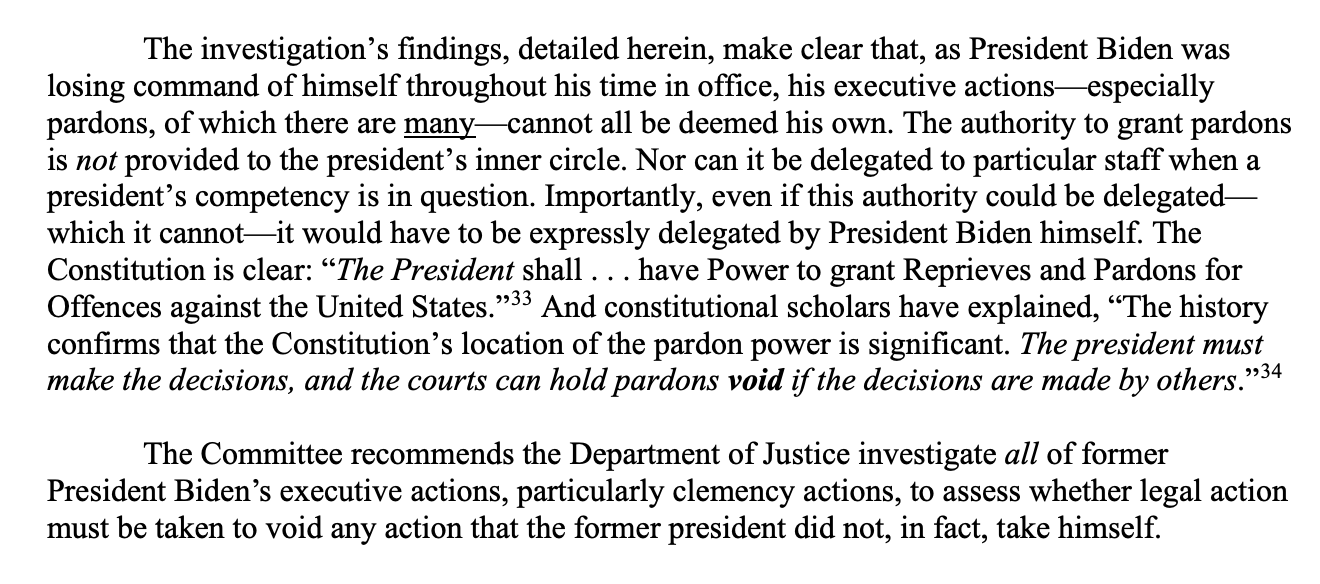
By that logic, Trump’s claim that he doesn’t know who he pardoned is hardly exculpatory. If a pardon must reflect the president’s own decision‑making, “I don’t know him” invites the very same scrutiny the staff of House Oversight Chair James Comer (R-KY) just leveled at Biden.
Comer was subsequently asked about Trump’s claims not to know Zhao. “Well I mean I would assume he knew. But if he said he didn’t I have to look and see what he said. Sometimes he says things and we have to really analyze and give him another opportunity to make sure he didn't misspeak.”12
Have information? Send tips (no PR) to molly0xfff.07 on Signal or molly@mollywhite.net (PGP).
I have disclosures for my work and writing pertaining to cryptocurrencies.
Footnotes
Prior to taking the role at CBS News, Weiss was an op-ed editor at the Wall Street Journal and then an opinion columnist for the New York Times. After loudly quitting the Times with a public resignation letter in which she styled herself as a martyr for free speech, she created the Substack blog The Free Press. This year, shortly after CBS’s $16 million payment to settle the Trump lawsuit paved the way for the Paramount/CBS and Skydance merger, the conglomeration paid $150 million to acquire The Free Press and installed Weiss — who Trump described during this interview as a “great, new leader” — as editor-in-chief at CBS. She was quick to demonstrate her journalistic prowess in the role, reportedly recently recommending that the network invite Da Vinci Code novelist Dan Brown to weigh in on the Louvre jewel heist. If anyone has a spare nine figures they’re looking to blow on acquiring a newsletter and an editor-in-chief with no experience leading a newsroom, Citation Needed will entertain offers.13 ↩
Binance already supported trading for USD1 on its global cryptocurrency exchange. Binance.US, which offers a more limited array of tokens and services to US customers, only just began offering it on October 29 — about a week after CZ’s pardon. ↩
References
“Binance founder’s pardon shows power of Trump allies on K Street”, Politico. ↩
“Binance and CEO Plead Guilty to Federal Charges in $4B Resolution”, Department of Justice. ↩
“Read the full transcript of Norah O'Donnell's interview with President Trump here”, CBS News. ↩
“NEWS: Sens. Schiff, Warren Introduce Resolution to Condemn Trump’s Pardoning of Binance Founder Changpeng Zhao”, Adam Schiff. ↩
“Battle between Elizabeth Warren and Changpeng ‘CZ’ Zhao heats up after Trump pardons crypto mogul”, The New York Post. ↩
“Re: Your Letter to Senator Elizabeth Warren dated October 28, 2025”, letter sent November 2, 2025. ↩
“Letter to DOJ Treasury re Binance Pardon”, October 28, 2025. ↩
“The Biden Autopen Presidency: Decline, Delusion, and Deception in the White House”, report prepared by the House Committee on Oversight and Government Reform Majority Staff, October 28, 2025. ↩
“Bari’s Bright Ideas”, Breaker Media. ↩

